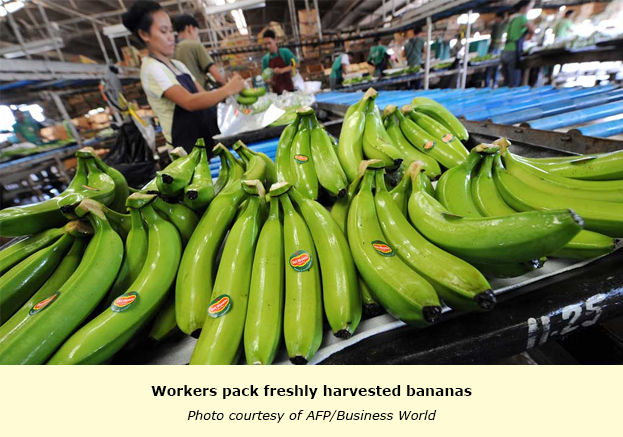Philippines is considering a preferential trade agreement with South Korea to ease access for its banana exports, or may seek to include provisions for banana exports in the Association of Southeast Asian Nations (ASEAN) free trade agreement.

Trade Secretary Ramon M. Lopez said he met recently with his South Korean counterpart, Kim Chun, to explore greater market access for bananas to South Korea, including lower tariffs.
“We are considering options on a better process moving forward, either bilateral through a Pref(erential) Trading arrangement PTA or under ASEAN-Korea,” Mr. Lopez told reporters in a mobile message.
“We will push this forward and issue a paper in the next two weeks,” he added.
Mr. Lopez noted that the Philippines remains South Korea’s leading banana supplier, accounting for about 85% of the market. However, other countries are trying to increase their market access, possibly leading to stiffer competition in the future, he said.
A preferential trading agreement may cover only certain products or trade arrangements and may only be valid for a certain number of years.
ASEAN’s FTA with South Korea was signed in 2005.
Under the FTA, bananas, including plantains, fresh or dried, are classified as a “sensitive” commodity and its final status has not yet been negotiated.
Peru is expected to be granted zero tariffs by next year, while Vietnam, Ecuador, Costa Rica and Honduras will enjoy the same by 2022.
Philippine banana shipments to South Korea are subject to a 30% tariff.
South Korea is the Philippines’ third-biggest banana market after Japan and China.
Regarding the Regional Comprehensive Economic Partnership (RCEP), which South Korea is part of, Mr. Lopez reported “good progress” in the talks among the 10 ASEAN country-members and six non-ASEAN free trade agreement partners.
“[There is] good progress on RCEP discussions as we further fine-tune the key elements with agreements on more parameters, such as level of inclusion on tariff reduction and minimal exclusion list, got goods services and investments,” Mr. Lopez said, noting that more updates will be released in the next few months.
Participating countries include ASEAN member countries plus six of its FTA partners — China, Japan, South Korea, India, Australia and New Zealand.
If concluded, RCEP will be the largest economic trade bloc, representing close to half of the world’s population; almost a third of the global economy; and a quarter of the world’s exports.
Mr. Lopez also expects ASEAN members to sign a deal soon to strengthen e-commerce in the region.
Source: Janina C. Lim, Business World
